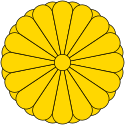
Back Eerste minister van Japan Afrikaans Primer ministro de Chapón AN رئيس وزراء اليابان Arabic رئيس وزرا اليابان ARZ Yaponiya Baş naziri Azerbaijani Прэм’ер-міністр Японіі Byelorussian জাপানের প্রধানমন্ত্রী Bengali/Bangla Premijer Japana BS Primer Ministre del Japó Catalan Premierminister von Japan German
| Prime Minister of Japan | |
|---|---|
| 日本国内閣総理大臣 | |
 Emblem of the Prime Minister of Japan | |
 Standard of the Prime Minister of Japan | |
since 1 October 2024 | |
| Executive branch of the Japanese government Office of the Prime Minister | |
| Style | Naikaku sōridaijin (formal) His Excellency (formal and diplomatic) Shushō (informal and during Party debates) Sōri (informal) |
| Type | Head of government |
| Member of | Cabinet National Security Council National Diet |
| Residence | Naikaku Sōri Daijin Kantei |
| Seat | Tokyo |
| Nominator | National Diet |
| Appointer | Emperor |
| Term length | No fixed term length, renewable indefinitely.[a] |
| Constituting instrument | Constitution of Japan |
| Precursor | Daijō-daijin of Japan |
| Formation | 22 December 1885 |
| First holder | Itō Hirobumi |
| Deputy | Deputy Prime Minister |
| Salary | ¥40,490,000/ US$ 296,478 annually[1] |
| Website | Official website |
| This article is part of a series on |
 |
|---|
|
|
The prime minister of Japan (Japanese: 内閣総理大臣, Hepburn: Naikaku Sōri-Daijin) is the head of government of Japan. The prime minister chairs the Cabinet of Japan and has the ability to select and dismiss its ministers of state. The prime minister also serves as the commander-in-chief of the Japan Self Defence Forces[2] and is a sitting member of either house of the National Diet (typically the House of Representatives).
The Emperor appoints as prime minister the person who is nominated by the National Diet (the parliament). The prime minister must retain the confidence of the House of Representatives to remain in office. The prime minister lives and works at the Naikaku Sōri Daijin Kantei (Prime Minister's Official Residence) in Nagatachō, Chiyoda, Tokyo, close to the National Diet Building.
Sixty-five men have served as prime minister, the first of whom was Itō Hirobumi taking office on 22 December 1885. The longest-serving prime minister was Shinzo Abe, who served over eight years, and the shortest-serving was Prince Naruhiko Higashikuni, who served fifty-four days. The current prime minister is Shigeru Ishiba, who succeeded Fumio Kishida on 1 October 2024, following the 2024 Liberal Democratic Party presidential election.
Cite error: There are <ref group=lower-alpha> tags or {{efn}} templates on this page, but the references will not show without a {{reflist|group=lower-alpha}} template or {{notelist}} template (see the help page).
- ^ 首相は4049万円、閣僚の給料は安い?高い? 菅内閣誕生ドキュメント (in Japanese), The Nikkei, 16 September 2020, retrieved 20 May 2022
- ^ "Book review: A nuanced deep dive on Japan's Self-Defense Forces".
